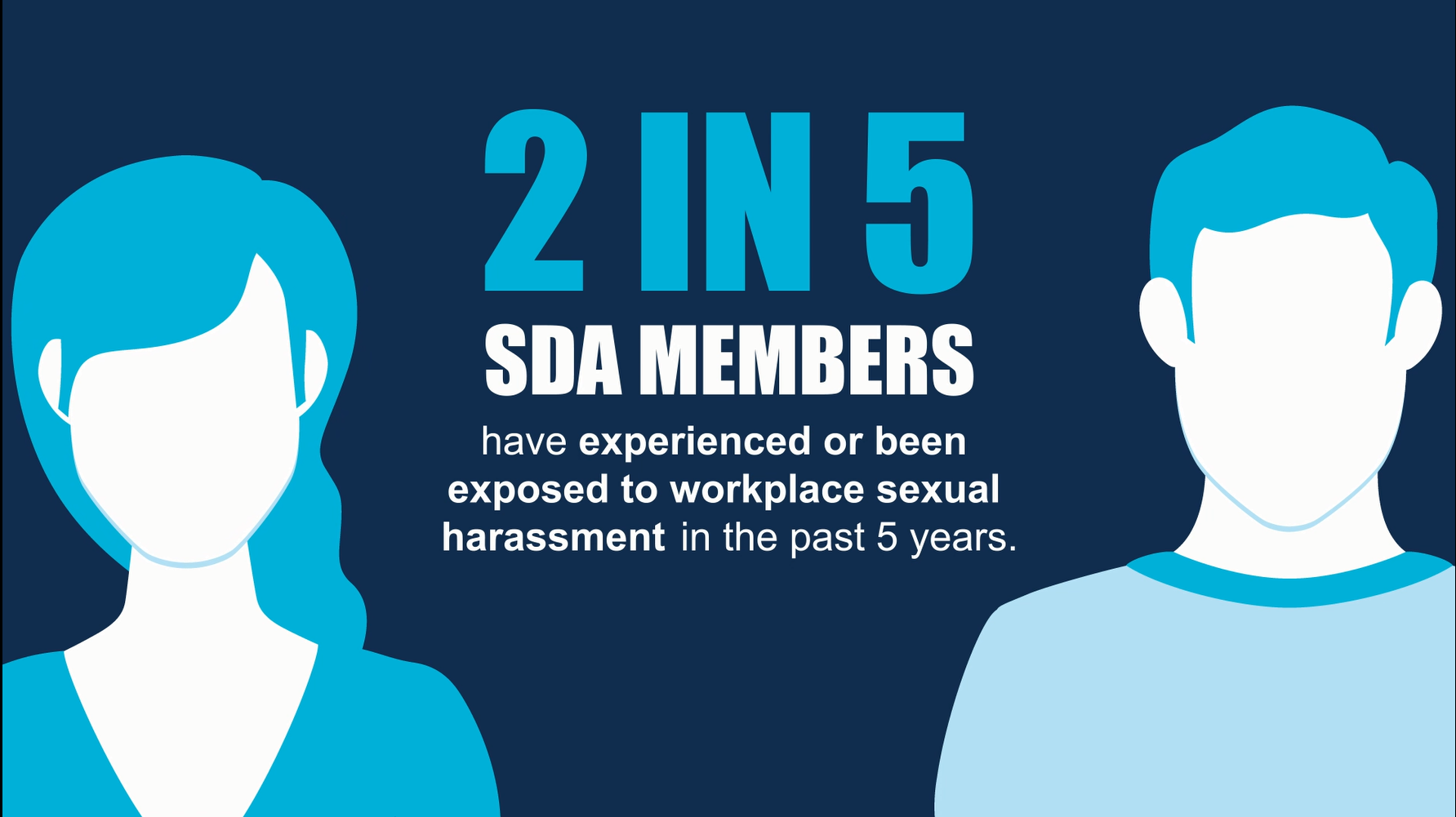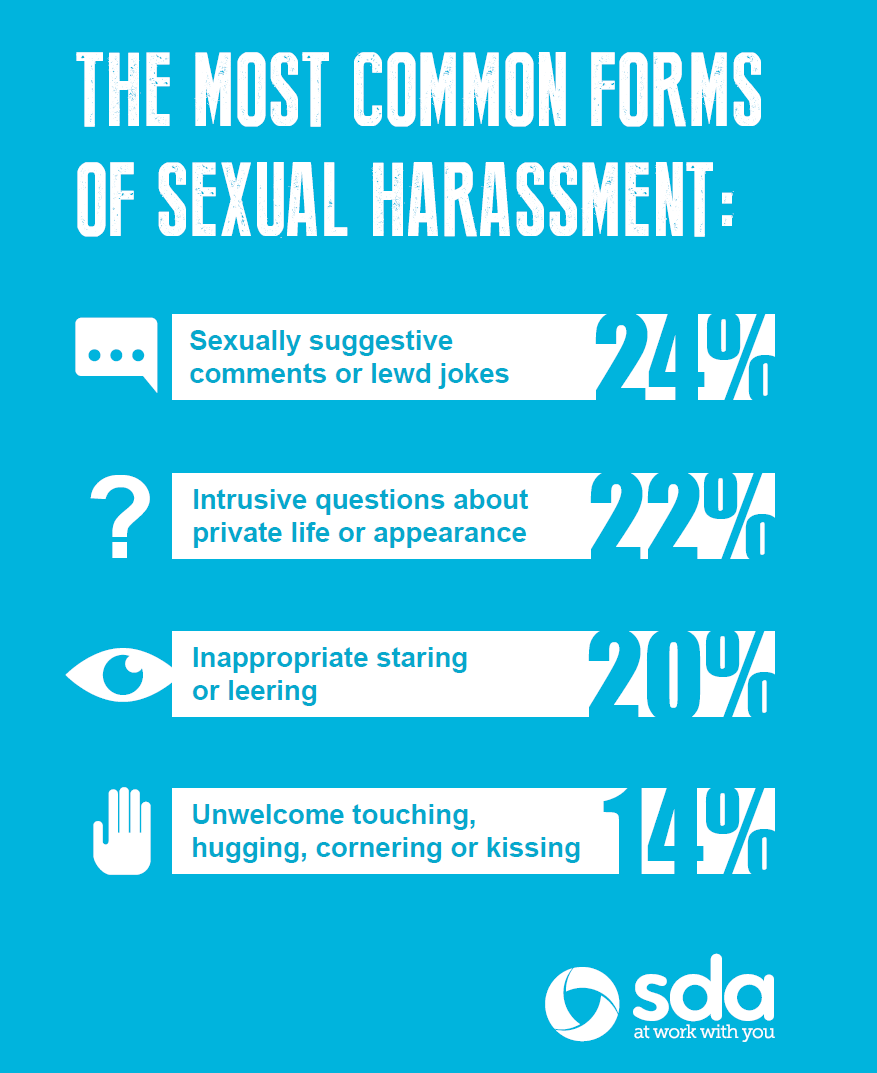Everyone's Business: Sexual harassment of SDA members (2019)
The SDA and the Australian Human Rights Commission surveyed over 3,400 retail, fast food and warehouse workers and found the rates of sexual harassment terrifyingly high. That’s not okay! If it happens to you, don’t be afraid to report it, so your employer can take steps to stop it.
YOU CAN READ THE FULL REPORT HERE

Key Findings
Female SDA members were more likely to have been sexually harassed in the workplace than male SDA members (46% compared to 29%).
More than a third of incidents of workplace sexual harassment in the last five years were perpetrated by a customer (36%).
Only 13% of SDA members had made a formal complaint or report about their most recent incident of workplace sexual harassment.
What Is Sexual Harassment?
All workers have a right to safe work environment, free from sexual harassment.
Sexual harassment is any physical or verbal conduct or visual display, which is:
- of a sexual nature,
- unwelcome and uninvited, or
- offensive, humiliating or intimidating.
Sexual harassment is not about occasional compliments and has nothing to do with the mutual attractions of friendship, which are consensual and acceptable to both parties. These are private concerns.
Grounds for sexual harassment can exist whether the harassment was intended or unintended.
Sexual harassment can take many forms, including:
- Suggestive remarks and sexually explicit conversations
- Unnecessary familiarity, such as deliberately brushing up against a person or unwelcome touching
- Unwelcome jokes of a sexual nature in your presence or about you
- Displaying or sharing sexually explicit material, including via text and social media platforms
- Sexual propositions or repeated unwanted requests to go out on dates

Sexual harassment may also constitute a criminal offense, including:
- Obscene communications (telephone, calls, email, SMS/text messaging, letters etc)
- Touching a person where the touching is sexual in nature, which is also sexual assault
- Stalking or indecent exposure
Although it is most commonly experienced by women, both men and women can experience sexual harassment at work and the harassment can be directed to a person of the same sex. The complainant also does not have to be directly involved, a third person may be offended by harassing behaviour among willing participants.
The harasser could be an individual or a group and may be demonstrated by a manager, supervisor, a work colleague, from an independent contractor or supplier visiting the workplace, or for a significant number of SDA members, from customers.
Employers have to take reasonable steps to prevent and eliminate sexual harassment from their workplace. This goes beyond simply developing a policy and hoping any sexually untoward behaviour ceases to occur.
Active strategies must be implemented to monitor, prevent and eliminate the occurrence of sexual harassment at work.
What constitutes ‘reasonable steps’ within a company could vary at each workplace but should never exclude the minimum standards for harassment prevention and mitigation. Every workplace is expected to have a current, valid and legal company policy, complaint procedures and training for staff and company management, along with enterprise agreements and contracts that reflect current legislation.
Your employer maintains the primary responsibility to investigate and resolve any sexual harassment complaints, the responsibility does not lie with the individual employee.
If you have been sexually harassed or you have witnessed sexual harassment in your workplace you can report the incident or make a complaint.
If you don’t feel comfortable approaching the harasser, the harassment continues or is criminal in nature please contact the SDA for support.You have protection under the law from victimisation or adverse action if you make a complaint of sexual harassment or if you are a witness of a complaint made by a co-worker.
Sexual harassment is unacceptable behaviour and is a breach of the fundamental right of an employee to work in a physically and psychologically safe environment, and to be treated fairly and with respect.
Sexual harassment can create an intimidating, hostile and offensive work environment. It is distressing and can affect a person’s mental and physical wellbeing. It is therefore an important health and safety issue.
The SDA treats all complaints seriously and sympathetically and endeavours to deal with each claim promptly and confidentially. The SDA will ensure, to the extent that we are able, that complaints will be fully investigated by the company in an impartial manner in search for a resolution that is just and equitable.
The SDA will also act to ensure that steps are taken by the employer to prevent further sexual harassment occurring in their workplace.
Remember, the SDA provides support, advice and representation to members experiencing sexual harassment at work. If you experience or witness sexual harassment at work, call the SDA.
If you need help with workplace sexual harassment, call your local SDA Branch. If you need immediate professional help, click here for a list of useful resources.
The SDA has always proactively worked to stop sexual harassment in the workplace. Some of our recent work includes:
- Training all SDA officials on sexual harassment and how to handle member sexual harasmment complaints
- Partnering with the Australian Human Rights Commission to survey SDA members survey about sexual harassment
- Launching the results of the Australian Human Rights Commission and SDA survey to highlight the seriousness of sexual harassment for SDA members
- Engaging with employer and industry on the results of the survey and calling out the need for better reporting, response and preventative measures for workers
- SDA Submission to the Australian Human Rights Commission National Inquiry into workplace sexual harassment
- Advocating for legislative change
- Support for the ILO Convention against violence and harassment at work
- Advocating for sexual harassment and other psychosocial hazards to be included in WHS regulations
- Including sexual harassment by customers in our No One Deserves A Serve campaign to eliminate abuse and violence from customers towards workers